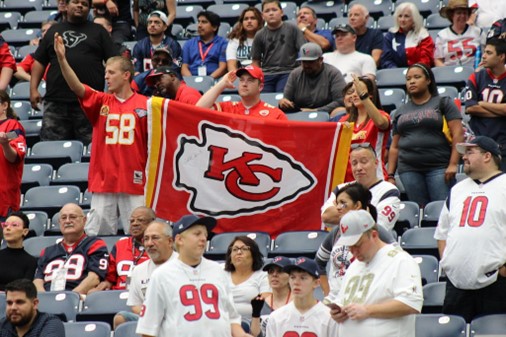Steve Lathrop is an avid supporter of the Kansas City Chiefs, often reporting on team stats, news, and game highlights, However, in the following article, Steven Lathrop addresses the impact that the potential relocation of the team could have on the city and its passionate fan base. He explores the economic repercussions, cultural implications, and community consequences that would follow if the team were to leave its historic home.
The Kansas City Chiefs, a team that has recently captured the hearts of NFL fans with back-to-back Super Bowl victories, are reportedly considering a move if their demands for increased taxes are not met. This controversial stance has sparked debate among local citizens, raising questions about the balance between public funding and private enterprise. Here’s a detailed look into the situation and what it could mean for the Chiefs’ future in Kansas City.
Steve Lathrop from Kansas City Highlights Necessary Funding for Stadium Renovations
The Chiefs have made it clear that they want Jackson County citizens to foot the bill for significant stadium renovations and infrastructure projects. The proposed plan involves extending a 3/8-cent sales tax through 2064, ensuring a steady stream of public revenue to support the Chiefs’ desired upgrades to Arrowhead Stadium and the construction of a new ballpark for the Kansas City Royals.
This initiative would place a substantial tax burden on current residents and future generations. The team’s position has drawn criticism, given that the team’s owner, Clark Hunt, and the organization itself are in a strong financial position, with lucrative revenue streams from ticket sales, merchandise, and sponsorships. Despite their success, the Chiefs are relying on public funding to maintain and upgrade their facilities.
Potential Relocation if Tax Increase Fails
Chiefs President Mark Donovan has indicated that if voters reject the tax extension, the team may consider relocating from Jackson County. This threat has added urgency to the debate, as the Chiefs explore all possible options for their future. Although Donovan expressed that the Chiefs’ preference is to stay in Kansas City, the prospect of moving looms if the financial conditions are not met. However, he emphasized that their primary goal is to remain in the city and that they are open to negotiating a deal with the county to ensure they can stay.
 The Chiefs’ Alleged Frugality and Facility Complaints
The Chiefs’ Alleged Frugality and Facility Complaints
The Chiefs’ demand for public funding comes amidst criticism about their frugality and outdated facilities. An NFLPA survey revealed that Chiefs players are dissatisfied with the team’s club facility, which is seen as outdated compared to other NFL teams. This dissatisfaction has raised questions about the Chiefs’ willingness to invest in their own infrastructure without burdening local taxpayers.
Steve Lathrop says that given the Chiefs’ financial resources, many believe they could fund their stadium improvements privately. The team has benefitted from significant revenue streams, including high ticket prices, merchandise sales, and sponsorship deals. Yet, the Chiefs are pushing for a tax extension, arguing that public investment is necessary for the team’s continued presence in Kansas City.
Citizens’ Reactions and Future Implications
The request for a tax extension has generated mixed reactions among local citizens. Some believe the team is a vital part of Kansas City’s identity, contributing to the city’s economy and national profile. However, others view the demand for public funding as excessive, particularly when the team’s ownership has substantial financial resources.
The potential move also raises broader questions about the relationship between sports franchises and their host cities. Teams often seek public funding for stadium projects, but the burden of these taxes falls on the citizens. Critics argue that private enterprises should not rely on public funding, especially when ownership has the means to finance their projects.
Steven Lathrop of Missouri explains that if the football team relocated, it would have a profound impact on the city, affecting its economy, culture, and sense of community. Here’s a breakdown of what such a move could mean:
- Economic Impact: The Chiefs’ presence generates significant revenue through ticket tourism. Relocation would lead to job losses for stadium staff, local vendors, and businesses that rely on game-day crowds. The ripple effect could be felt across the hospitality sector, including hotels, restaurants, and transportation services.
- Cultural Loss: The Chiefs are more than just a football team in Kansas City; they are an integral part of the city’s identity. Relocation would erase a long-standing tradition of local pride, leaving a void in the community’s shared experiences and celebrations. The iconic red and gold colors, the “Arrowhead Chop,” and game-day traditions would all become memories.
- Community Connection: The Chiefs have deep-rooted ties to Kansas City’s communities, supporting local charities, schools, and youth programs. If the team left, it would create a gap in these outreach efforts, impacting the broader social fabric of the city. The sense of unity and camaraderie that the Chiefs foster among fans would also be diminished.
- Sports Legacy: The team’s success, including their Super Bowl victories, has contributed to Kansas City’s national recognition. Relocation would strip the city of its place on the NFL map, reducing its visibility in the sports world and potentially affecting other sports and entertainment opportunities.
Overall, if the Chiefs relocated, Kansas City would lose a major economic engine, a cultural icon, and a source of community pride, profoundly altering the city’s landscape and identity.
Conclusion
Steven Lathrop of Kansas City explains that the team’s threat of relocation if local citizens refuse a sales tax increase highlights the complex dynamics between sports franchises and public funding initiatives. While the Chiefs have expressed a desire to stay in Kansas City, their willingness to consider moving raises concerns about the financial expectations placed on local taxpayers. As the decision to extend the tax comes to a vote, the outcome will have significant implications for the future of the Chiefs and their relationship with the city they call home.








